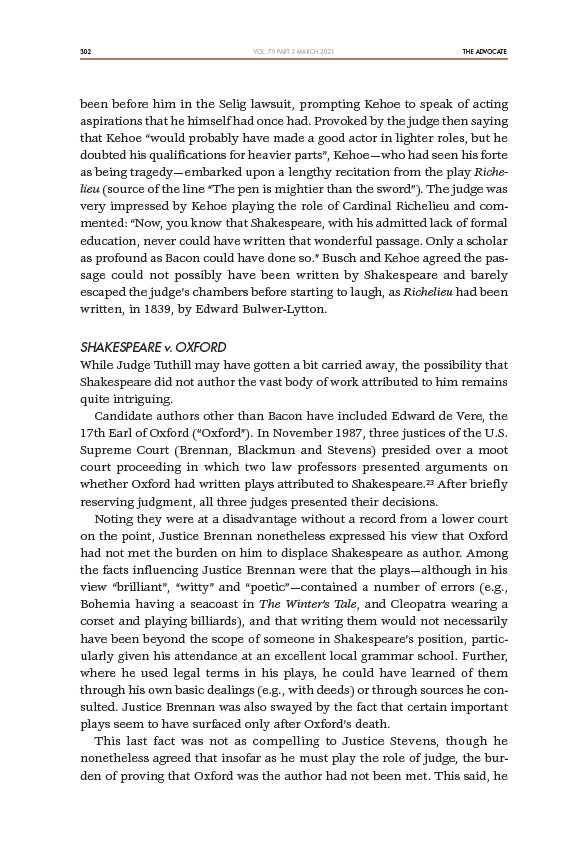
302 THE ADVOCATE
VOL. 79 PART 2 MARCH 2021
been before him in the Selig lawsuit, prompting Kehoe to speak of acting
aspirations that he himself had once had. Provoked by the judge then saying
that Kehoe “would probably have made a good actor in lighter roles, but he
doubted his qualifications for heavier parts”, Kehoe—who had seen his forte
as being tragedy—embarked upon a lengthy recitation from the play Richelieu
(source of the line “The pen is mightier than the sword”). The judge was
very impressed by Kehoe playing the role of Cardinal Richelieu and commented:
“Now, you know that Shakespeare, with his admitted lack of formal
education, never could have written that wonderful passage. Only a scholar
as profound as Bacon could have done so.” Busch and Kehoe agreed the passage
could not possibly have been written by Shakespeare and barely
escaped the judge’s chambers before starting to laugh, as Richelieu had been
written, in 1839, by Edward Bulwer-Lytton.
SHAKESPEARE v. OXFORD
While Judge Tuthill may have gotten a bit carried away, the possibility that
Shakespeare did not author the vast body of work attributed to him remains
quite intriguing.
Candidate authors other than Bacon have included Edward de Vere, the
17th Earl of Oxford (“Oxford”). In November 1987, three justices of the U.S.
Supreme Court (Brennan, Blackmun and Stevens) presided over a moot
court proceeding in which two law professors presented arguments on
whether Oxford had written plays attributed to Shakespeare.23 After briefly
reserving judgment, all three judges presented their decisions.
Noting they were at a disadvantage without a record from a lower court
on the point, Justice Brennan nonetheless expressed his view that Oxford
had not met the burden on him to displace Shakespeare as author. Among
the facts influencing Justice Brennan were that the plays—although in his
view “brilliant”, “witty” and “poetic”—contained a number of errors (e.g.,
Bohemia having a seacoast in The Winter’s Tale, and Cleopatra wearing a
corset and playing billiards), and that writing them would not necessarily
have been beyond the scope of someone in Shakespeare’s position, particularly
given his attendance at an excellent local grammar school. Further,
where he used legal terms in his plays, he could have learned of them
through his own basic dealings (e.g., with deeds) or through sources he consulted.
Justice Brennan was also swayed by the fact that certain important
plays seem to have surfaced only after Oxford’s death.
This last fact was not as compelling to Justice Stevens, though he
nonetheless agreed that insofar as he must play the role of judge, the burden
of proving that Oxford was the author had not been met. This said, he